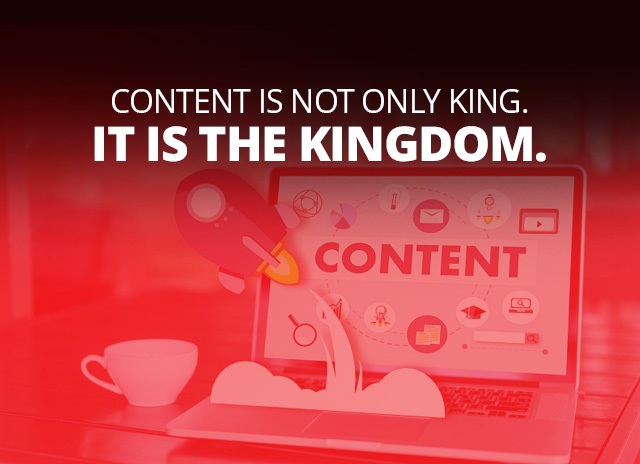More than two decades ago Bill Gates asserted, ‘Content Is King’. While this may be true to a certain extent, the most important aspect to consider is that content is king only if it is read. The focus of any business needs to be on creating good content to establish and build an ongoing relationship with its customers. ‘Content is not the king, but the kingdom to weave a story around.’
With the changing dynamics of the web and the evolution of social media, it becomes all the more imperative for organizations to focus on creating exceptional content, the kind that will get the attention of the target audience, engage them, provide them with the information they are looking for and generate results that you are looking for. As the famous marketing icon Neil Patel says “Good content should be interesting, challenging, entertaining and worthwhile. Otherwise, the producer (writer) has wasted his or her time.”
Good content is never enough as everyone in today’s day is putting out good content. It is important to have the knowledge to get content to reach the target audience using the various channels and ensure the traffic converts to customers/subscribers. Promoting the content through the right channels is as important as getting the content right. This requires a plan of action that clearly defines the steps to be taken to capture the audience, promote the content, analyze, and track how the content is performing and helps in conversion. As they say, ‘Conversation is the new lead’.
Marketers today understand the value of good content and the importance of having a content strategy in place to provide the target audience with the most relevant content as per their needs through the channels they interact with. Content strategy helps in aligning and standardizing the content delivery efforts of the organization in order to present a brand story and influence the target audience. Some of the key elements in creating a content strategy for an organisation are:
- Align content strategy with the overall business objectives – It is important for any organization to have clearly defined objectives for the content strategy to ensure that it aligns with the marketing and sales of the overall business. Just producing good content is never enough. A well laid out a drafted plan which gives clear reasoning for creating content, the channels to be used and how best to optimize content to the advantage of the organisation is essential for the success of a content strategy.
- Get management to buy-in on the financial aspect of the content strategy – Getting approval from the leadership team and the management is the toughest part of content strategy. Clearly laying out the cost, benefits and the value drivers of the content strategy is imperative for it to be considered by the management. Value divers would be boost from effective targeting, timing, and content, lower cost through channel shift, deriving efficiencies through a focus on valuable and prospective customers.
- Effective segmentation – Targeting content to specific audiences is an effective way to ensure that it is viewed by the audience. It is important to understand how well the content was received by the target audience in the engagement cycle. A road map should be designed to help understand the customer journey and support sales. This will also help devise plans for future delivery of content through the right platforms to the target audience and maximize the financial value for the organisation.
- Selecting the right platform – Having an understanding of the unique segments to be targeted along with their typical behaviour across the online and offline channels will help select the right platform giving the much-needed boost to the content. Viewing each platform from the user’s perspective will help in getting a better understanding of what they experience and adjust the strategy to help them view content as you want them to view it.
Having understood the key elements of content strategy, let us now look at the current trends that are changing the content marketing scene:
- Visual Content – Has become an integral part of a content marketing plan as the target audience are drawn to the visual elements of all kinds. The advantage it lends is that it presents new and creative ways to help form a brand voice and personality. Higher engagement can be achieved for new content through the use of social media channels which can help drive traffic to the website.
- Mobile-first content – Content today needs to be optimized for a mobile experience as many users access content through their smartphones or tablets.
- Metrics for reporting – Having different touchpoints for the content makes it difficult to measure its ROI. However, a successful content marketing strategy must show ROI and data to support it.
For marketers, the content has always been a key powerful element of the kingdom gaining more important today than ever before. Creating valuable content is not the end but a means to achieve business objectives and assist in the attainment of sales objectives. A well-drafted content marketing strategy will help the organisation achieve higher engagement and conversion.
Delivering content through the right platforms to the right person at the right time is crucial for optimization and measurements of ROI.

